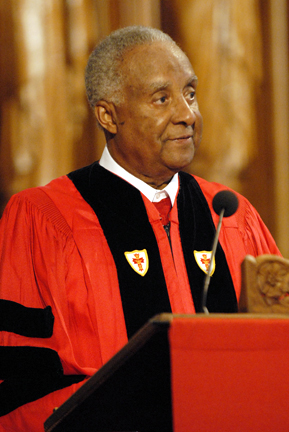William H. Hayling to Baccalaureate Celebrants: “Become a Mentor.”
Champion of social justice says education is the most powerful world-changing tool

William H. Hayling, a renowned African-American obstetrician and founder of 100 Black Men of America, was only 14 when his father died of pneumonia. Such a profound loss would send many adolescents into a self-destructive spiral of grief and anger, but Hayling was more fortunate than most. “I had a very supportive mother and several family friends,” the 82-year-old physician told the audience at Boston University’s Commencement day Baccalaureate Service Sunday at Marsh Chapel. “They became my mentors.”
Hayling, who attributes his success to these early role models, urged the crowd to “help another human being who needs some guidance,” by becoming a mentor. “Remember,” he said, “the greatness of an institution is judged not by its library or endowment, but by the contributions of the men and women who go forth from it, the services they render to others, and the humility in which they serve.”
During his 55-year career, Hayling has treated thousands of women and delivered more than 8,000 babies, but he is most proud of his leadership role as a teen mentor. “My true passion is helping young people grow into productive and compassionate leaders,” he said, “particularly those who have had poor or absent male role models in their lives.”
As is tradition, the Baccalaureate Service opened with an organ and brass ensemble, followed by a greeting and prayer led by Reverend Robert Allan Hill, the dean of Marsh Chapel. University Provost David Campbell read from the Wisdom of Solomon, and President Robert Brown read from the Gospel of Matthew.
Hill then introduced Hayling, describing him as a man “whose vocation to healing reached out to meet the needs of others.”
Hayling began his address by reminiscing about 1943 — the year he entered Boston University as a 17-year-old premed student. A gifted athlete, he soon found himself dedicating too much time to the varsity basketball team and too little time to his studies — until he received a stern letter from a family friend and physician. “He asked if I was planning to become a basketball player or a doctor,” he recalled. “So I dropped basketball to concentrate solely on my premed subjects.”
Hayling graduated at age 23 from the Howard University College of Medicine and accepted a residency at Harlem Hospital in New York City. He later served as a battlefield surgeon with a MASH unit during the Korean War, earning a Bronze Star. From 1957 until 1981, he was chief of ambulatory obstetrics and gynecology at Martin Luther King, Jr., Hospital in Los Angeles, and from 1981 until 1998, he was a faculty member at the Charles R. Drew University of Medicine and Science.
But Hayling is best known for his work outside of medicine. Following the example set by the role models from his youth, Hayling cofounded 100 Black Men of America, Inc., a mentoring program for young African-Americans and other minorities, in 1963. Other founding members included baseball legend Jackie Robinson and David Dinkins, who later became mayor of New York City. The organization has more than 100 chapters and 10,000 members. Hayling also volunteers with Mentoring Today for Tomorrow, an after-school program for young people ages 9 through 18, in California’s Riverside County.
Concluding his address, Hayling told Baccalaureate celebrants that education is the most important weapon they can use to change the world. “You will make errors in some of your decisions in life,” Hayling said, “but you must never err in your purpose or resolve. Even if you never achieve your ideals, always be in the pursuit of excellence.”
Vicky Waltz can be reached at vwaltz@bu.edu.
Comments & Discussion
Boston University moderates comments to facilitate an informed, substantive, civil conversation. Abusive, profane, self-promotional, misleading, incoherent or off-topic comments will be rejected. Moderators are staffed during regular business hours (EST) and can only accept comments written in English. Statistics or facts must include a citation or a link to the citation.